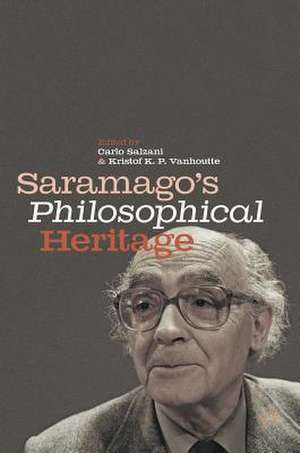Saramago’s Philosophical Heritage
Editat de Carlo Salzani, Kristof K. P. Vanhoutteen Limba Engleză Hardback – 25 iul 2018
| Toate formatele și edițiile | Preț | Express |
|---|---|---|
| Paperback (1) | 580.82 lei 43-57 zile | |
| Springer International Publishing – 26 ian 2019 | 580.82 lei 43-57 zile | |
| Hardback (1) | 642.68 lei 43-57 zile | |
| Springer International Publishing – 25 iul 2018 | 642.68 lei 43-57 zile |
Preț: 642.68 lei
Preț vechi: 756.09 lei
-15% Nou
Puncte Express: 964
Preț estimativ în valută:
122.98€ • 128.72$ • 102.36£
122.98€ • 128.72$ • 102.36£
Carte tipărită la comandă
Livrare economică 31 martie-14 aprilie
Preluare comenzi: 021 569.72.76
Specificații
ISBN-13: 9783319919225
ISBN-10: 3319919229
Pagini: 281
Ilustrații: XIII, 261 p.
Dimensiuni: 148 x 210 mm
Greutate: 0.48 kg
Ediția:1st ed. 2018
Editura: Springer International Publishing
Colecția Palgrave Macmillan
Locul publicării:Cham, Switzerland
ISBN-10: 3319919229
Pagini: 281
Ilustrații: XIII, 261 p.
Dimensiuni: 148 x 210 mm
Greutate: 0.48 kg
Ediția:1st ed. 2018
Editura: Springer International Publishing
Colecția Palgrave Macmillan
Locul publicării:Cham, Switzerland
Cuprins
1. Introduction: Proteus the Philosopher, Or, Reading Saramago as a Lover of Wisdom.- 2. Correcting History: Apocalypticism, Messianism and Saramago’s Philosophy of History.- 3. The “Dark Side” of History: Saramago, Foucault and Synchronic History.- 4. José Saramago’s “Magical” Historical Materialism.- 5. Some Remarks on a Phenomenological Interpretation of Saramago’s Cave.- 6. Death by Representation: In Law, in Literature, and in That Space Between.- 7. A Contemporary Midrash: Saramago’s Re-telling of the “Sacrifice of Isaac”.- 8. Female Representations in José Saramago: A Space for Oppositional Discourses from the Canonical Gospels to the Gospel According to Jesus Christ.- 9. Saramago’s Axiology of Gender Difference.- 10. Saramago’s Dogs: For an Inclusive Humanism.- 11. Traumatic Counterfactuals.- 12. Bye Bye Bartleby and Hello Seeing, or, On the Silence and the Actualization to Do… Not.
Notă biografică
Carlo Salzani is an independent scholar and translator. He has published on Walter Benjamin, Giorgio Agamben, and contemporary German literature and philosophy more generally, both in English and in Italian.
Kristof K.P. Vanhoutte is Research Fellow at the International Studies Group of the University of the Free State, Bloemfontein, South Africa, and an Invited Professor of philosophy at the Pontifical University Antonianum, Rome, Italy.
Kristof K.P. Vanhoutte is Research Fellow at the International Studies Group of the University of the Free State, Bloemfontein, South Africa, and an Invited Professor of philosophy at the Pontifical University Antonianum, Rome, Italy.
Textul de pe ultima copertă
The past decades have seen a growing “philosophical” interest in a number of authors, but strangely enough Saramago’s oeuvre has been left somewhat aside. This volume aims at filling this gap by providing a diverse range of philosophical perspectives and expositions on Saramago’s work. The chapters explore some possible issues arising from his works: from his use of Plato’s allegory of the cave to his re-readings of Biblical stories; from his critique and “reinvention” of philosophy of history to his allegorical exploration of alternative histories; from his humorous approach to our being-towards-death to the revolutionary political charge of his fiction. The essays here confront Saramago’s fiction with concepts, theories, and suggestions belonging to various philosophical traditions and philosophers including Plato, Pascal, Kierkegaard, Freud, Benjamin, Heidegger, Lacan, Foucault, Patočka, Derrida, Agamben, and Žižek.
Caracteristici
Provides a diverse range of philosophical perspectives and expositions on Saramago's writing Presents international and interdisciplinary perspectives Combines philosophy and literature, as well as fields as varied as law, theology, political theory, and feminism
